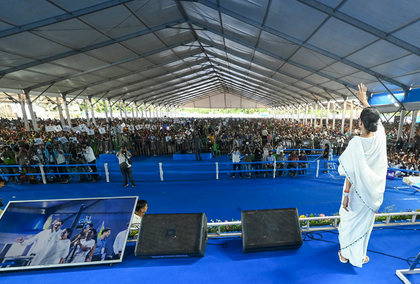West Bengal’s football passion and its political exploitation
By IANS | Updated: September 12, 2025 18:55 IST2025-09-12T18:53:32+5:302025-09-12T18:55:03+5:30
Kolkata, Sep 12 West Bengal’s love affair with football offers fertile ground for political messaging. And the parties ...

West Bengal’s football passion and its political exploitation
Kolkata, Sep 12 West Bengal’s love affair with football offers fertile ground for political messaging. And the parties furrow it well for planting their seeds of propaganda.
With Assembly elections due next year, West Bengal’s principal opposition Bharatiya Janata Party (BJP) has taken the field, while the state's sports ministry is organising its own tournament.
Though top leaders are not donning football boots themselves, they did kick off respective tournaments on Thursday, September 11, marking the day of Swami Vivekananda’s historic address at the World Parliament of Religions at Chicago in 1893. Narendranath Datta was the birth name of the monk-philosopher.
The BJP has rolled out the Narendra Cup, which will conclude on September 17, the birthday of Prime Minister Narendra Modi.
Meanwhile, under the aegis of the state, the Swami Vivekananda Cup will continue until March 2026 -- closer to when polls are due.
Incidentally, TMC leader Abhishek Banerjee is the chief patron of the Diamond Harbour Football Cup. The team hogged headlines this year, beating East Bengal to reach the finals of the Durand Cup on its debut itself. Abhishek Banerjee represents Diamond Harbour constituency in the Lok Sabha.
His aunt and Chief Minister Mamata Banerjee had made efforts for the big clubs when they were passing through financial constraints. She still contributes funds to various sporting organisations.
West Bengal’s football culture traces back to the late 19th century, when colonial Calcutta saw the emergence of clubs that challenged British teams, culminating in Mohun Bagan’s historic 1911 IFA Shield victory.
Later, the East Bengal club came into being, sparking the now legendary rivalry between those from West Bengal and their counterparts who had roots in the East (now Bangladesh).
Over decades, packed stadiums, intense derbies, and local tournaments nurtured a fanatic following. Football bypassed class divides -- played on village fields and in urban grounds alike -- making it a potent symbol of regional pride and unity.
Political and poll strategy reached new heights with the rise of the slogan “Khela Hobe” (Game On), popularised by the TMC in the lead-up to the 2021 Assembly elections.
“Khela Hobe”, penned by TMC leader Debangshu Bhattacharya, ignited viral momentum across social media and local gatherings. The slogan galvanized supporters with renditions, chants, and posters at street corners and Durga Puja pandals, and was sustained through digital campaigns.
On August 16, 2021, TMC celebrated “Khela Hobe Diwas” across West Bengal by organising football matches. Mamata Banerjee chose the day for promoting sports as a mark of respect to 16 people who lost their lives in a stampede during a football match on August 16, 1980.
“Khela Hobe” became emblematic of TMC’s outreach to urban and rural youth alike, reinforcing group identity through a shared cultural touchstone.
And with another poll round the corner, the game is on.
Disclaimer: This post has been auto-published from an agency feed without any modifications to the text and has not been reviewed by an editor
Open in app